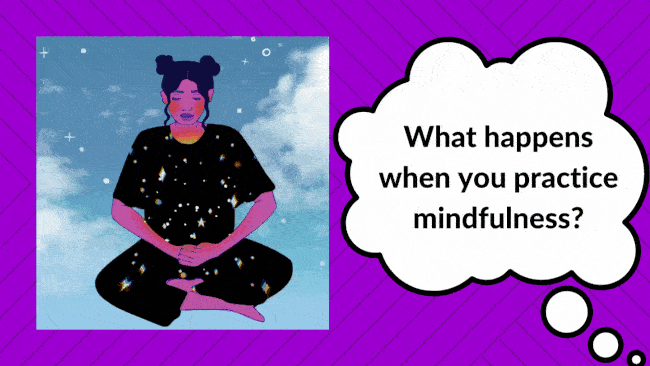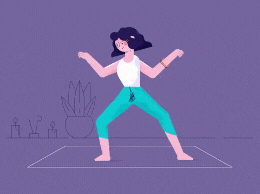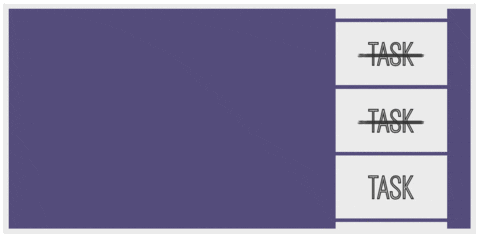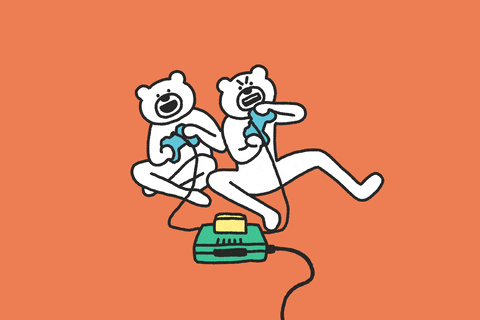
8 Healthy Habits for a Mindful Life
Follow these simple steps as a starting place for your mindfulness and self-care journey.
1. Discover the Science behind Mindfulness
Practicing mindfulness is an important part of taking care of yourself, but what exactly is mindfulness? Being mindful means to purposely pay attention to and live in the present moment. We can all be mindful, but it’s easy to fall out of practice with the world around us moving so fast.
Research suggests that practicing mindfulness could help the development of your prefrontal cortex—the logical control center of the brain. By grounding yourself in the present moment and becoming more aware of your emotions, you could better manage big emotions, like fear, anxiety, and anger. Mindfulness helps you move past gut reactions and strengthens your ability to respond to difficult situations calmly and logically.

2. Live in the Present Moment
Use mindfulness to lessen the impact of stress you face, whether it comes from schoolwork, family circumstances, social pressures, or other areas of your life. See if you can catch yourself thinking about the past (for example, a past mistake or embarrassing moment) or the future (worrying about something that might happen) and use one of your five senses (seeing, feeling, hearing, smelling, tasting) to pull yourself to the present. What’s one thing you notice with each of your senses?
Recognize what’s happening in your body with these questions:
- What are you feeling emotionally at this moment? Can you name the feeling(s)?

- Notice how your emotions show up in your body. Is there pain or tension in any specific place? Try loosening the muscles in your forehead, unclenching your jaw, and relaxing your shoulders.
- Can you find a more comfortable position? Do you need water or a snack? Take this moment to get comfortable, whatever that looks like for you.
If you catch yourself obsessing over past mistakes and embarrassing moments or worrying about the future, try focusing on one of your five senses to ground yourself in the present moment. For example, what are you seeing, feeling, hearing, smelling, or tasting right now?
Next, try a deep breathing exercise. Inhale through your nose and exhale through your mouth, like you are slowly blowing out a candle. Making the exhale longer than the inhale helps calm the nervous system.
Practice gratitude every day. Set aside some time each day to think about or write down what you’re grateful for in your life. When our brains realize it’s important enough to write down, we start subconsciously looking for things to be grateful for!
3. Reclaim Your Newsfeed
Once you have focused your attention on how you are feeling emotionally and physically in the present moment, what actions can you take to improve your daily life? Some research shows that the number of social media accounts you follow and how often you check social media are both associated with mental health issues including depression. Check your media consumption habits and how they may be affecting you with this short quiz.
If you think social media might be affecting your mental health in a negative way, it might be time to take a break for a bit or clean up your newsfeed!
- Tip: Go to Settings > Notifications and turn off unnecessary notifications. Try it for a day or a week to see how it feels.
- Take 15 minutes today to scroll through the accounts you follow on Instagram, TikTok, or other social media platforms. Be aware of how certain accounts make you feel. Does an influencer, celebrity, or peer’s feed make you feel discomfort, jealousy, anxiety, insecurity, or hopelessness? If so, we suggest hitting “unfollow” fast!
To change up your TikTok, YouTube, or Instagram newsfeed, try searching for topics you are genuinely interested in and interact with content that empowers, informs, or encourages you to go after your goals or try new things. Here are some topics you might want to search for:
- Mindfulness tips
- Daily affirmations
- Journaling prompts
- Motivational quotes
- Cute animals
4. Create a Calming Environment
Whether you are headed to bed or just trying to relax, it’s important to know how to create a calming and soothing environment.

Long-term exposure to stress or anxiety can negatively impact your physical and mental health. If you’re feeling a lot of pressure about an upcoming exam, performance, sports event, or something else, take some time to create a calming environment.
- Is reading your favorite way to de-stress and de-compress? Check out the comments on our recent giveaway for a list of great books recommended by the We Think Twice community.
- Is it important to you for your space to be clean before you can calm down? Try making your bed or wiping dust off a few surfaces before settling down to relax.
- Is your room lighting very bright? Try using a desk lamp or fairy lights instead of a harsh overhead light.
- Do you have a favorite playlist or podcast that soothes your nerves? Try playing it quietly in the background.
5. Rest Well
Rest allows your body to function effectively and improves your physical and emotional health. Teenagers should sleep between 8 to 10 hours every night to maintain good health, but school, homework, jobs, and extracurricular activities can make that hard to do. It’s important to think about how you can develop a routine to get enough rest.
If you want to build a healthy resting routine, start by putting your devices away. Studies show that increased technology use near bedtime can get in the way of your sleep. The blue light from your devices can disrupt the natural production of melatonin, a hormone that promotes sleep. To improve your sleep, put away the cell phone and other electronic devices at least an hour before bedtime. Instead, use that time to read, write in a journal, or meditate. If it’s difficult for you to go to bed without listening to something, try placing your device across the room and limit the number of songs you queue up. If you have to use your phone close to bedtime, try turning the brightness down low and setting a daily bedtime and wake time in your phone’s clock app.
6. Move Your Body Daily
Moving your body improves your physical, mental, and emotional health. It reduces your risk of chronic illnesses like diabetes and heart disease and can even reduce feelings of anger. It also improves brain function and helps you sleep better.

- Consider participating in a new sport, inviting friends to a pick-up basketball or soccer game, or going for a hike in your local public park.
- Even a daily 30-minute walk, a couple minutes of stretching, or going up and down a staircase a few times is beneficial.
- Exercise while you call a friend or listen to music or a podcast to make the time fly by. You can use exercise time as an opportunity to empty your mind of everything going on in the world and just move.
- Look on YouTube for quick, basic, or advanced yoga and exercises you could try out today.
7. Take One Step Forward
In a society obsessed with productivity and achievement, it can feel overwhelming to start a task, let alone complete it. Although people might encourage you to make long to-do lists and do as much with each minute as possible, our brains are not designed for heavy-duty multi-tasking! Here are some tips for making progress on an assignment or other goal without getting overwhelmed or procrastinating.

- Do a brain dump. Part of what stresses us out about all the things we need to do is having it all swimming around in our heads. Try writing down everything that comes to mind or keep an electronic list of tasks to help clear your mind.
- Set reasonable, specific goals. Break down a large goal into smaller steps. For example, when tackling homework for the week, on one day commit to completing two of your assigned homework problems, four sentences of writing, or 15 minutes of research.
- Write down your motivation. Think about your reasons for working toward a goal. Are you really interested in the subject and want to know more about it? Are you hoping to finish something to have more free time over the weekend? Do you want a good grade in a class for your college application?
- Be realistic about your schedule. Don’t overcommit your time and remember that completing a large task takes time and patience. Taking small, thoughtful, and consistent steps is the best thing you can do for yourself in this moment.
8. Connect with People
Connecting with the community around you can improve your emotional and mental health. Being part of a community helps promote a sense of belonging, support, and purpose. Consider trying these ways to grow closer to the people around you:
- Ask a friend to hang out. Go on a hike, watch a movie, shoot hoops, grab something to eat, or just talk and catch up.
- Have lunch with a family member. Make a meal together or go to your favorite local spot.
- Join a group or club. What are your interests? The possibilities are endless…a book club, sports team, art club, drama club, anything!
- Volunteer or participate in a service project. Giving back to your community can help you meet new, like-minded people and make a difference to the causes you care about.

Learn more from We Think Twice about taking care of your mental health. Find out how other young people practice self-care while accomplishing their goals. Learn how to talk with trusted adults in your life about mental health and how to get the support you need.
Mindfulness and Self-Care Resources
- Get the facts and bust some myths about mental health.
- Are you worried about a friend? Start a conversation about how they are doing or feeling.
- Feeling overwhelmed? Listen to this mindful breathing exercise.
- What is mindfulness, anyway? Find out what other teens are saying.
- Love podcasts? Check out this NPR Life Kit episode on appreciating what's right in front of you.
- If you're feeling stressed, try following these guides to mindful walking, mindful eating, and meditation.
- Check out the Smiling Mind meditation app: